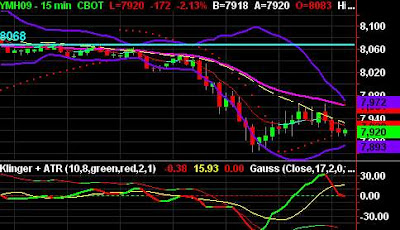
Stock traders over the past few days have successfully defended the prior lows for the major indexes. In this chart, the left chart shows today's 15 minute chart, showing a steady rise following this morning's open. The right chart shows the daily chart, with the November stock market lows near the left edge of the daily chart. Today's chart isn't complete yet, but today's candle shows what may be either a hammer bottom or a dragonfly doji forming. Until the day is done, the candle could certainly change, but it is worth watching and paying close attention to.
On the one hand, the more often we test the previous November lows, the more likely we are to see a breakout to the downside. We are, after all, close to the lows, and with good reason for being there. On the other hand, the more often we test those lows and hold them, the more likely we are to see a rally, as investors decide that "the worst is over" and want to buy at what they perceive to be "cheap" prices. This line of thinking exposes an investor/trader to a serious flaw in thinking. I call this flaw the "falling knife" syndrome. Just because a financial instrument has fallen precipitously, doesn't mean that it can't fall even more! And when traders are caught in the trap of thinking, "It has fallen so far, it just has to go higher now," they are likely to lose money. This is flawed thinking. In fact, from a purely statistical standpoint, when a breakout occurs, it is far more likely to continue in the original direction, rather than reverse direction. What has gone down, can go down more! Trying to catch the proverbial falling knife only results in bloodied finances!
Lows Are There For a Reason that is Neither Bullish Nor Bearish
These battleground levels are neither bullish, nor bearish. That's why they are battlegrounds! Prices consolidate at these levels because there is conflicting data, both bullish and bearish, at these price levels. It is a standoff! A breakout can occur in either direction at any time. I'll wait to take a position until I know who won that battle! I have found no consistent pattern that gives me confidence in either buying or selling at these consolidation/battleground levels for a longer-term trade. (To me, a long-term trade lasts days or a few weeks, not months or years.) If I am already in a profitable trade, as in this case (I hold some bearish ETFs right now), I will tighten my stops, often each day, so that if a breakout occurs against me, I will exit with as much profit as possible.
Money is Only Happy When Put to Work!
My money must be working for me all the time -- every day! I only trade, and I only hold a trade, as long as it is doing what I bought (or sold) it to do -- go up (or in the case of a sell, go down)! If it goes sideways or the wrong direction, I exit the trade "rapido"! Time is money, and wasted time is wasted money!
Emotional Peace Counts for SomethingThis strategy of holding a position only when profitable doesn't just save me money. It also permits me to sleep better at night. I saves me emotional angst! Peace of mind is worth its weight in gold!
Opportunity Cost -- Wrong Trade at the Wrong Time -- The One that Got Away
Lastly, and this is almost universally ignored among investors, it also prevents me from experiencing "opportunity loss". The cost of a lost opportunity because my money was tied up in a bad trade or unprofitable trade is a true cost, but it is a hidden cost. More accurately, it is an ignored cost. I'm not just in this business to make money! I'm in it to make money as quickly as possible. If I miss an opportunity while I'm waiting with white knuckles and praying for a trade to make money, or (heaven forbid) to turn from a loss to a gain, then I'm leaving money on the table. I lose the money I could have had if I had used my money on a different trade! That is a costly error -- literally!
Don't Give Control to the MarketI'm also giving control of my profitability and my money to the market. The market is not here to make money for me. Only I should be in control of that. Holding onto a bad or unprofitable trade transfers power and control of my money to market forces. Bad idea! This concept is taught powerfully by Phantom of the Pits in his book, "Phantom's Gift".
Laws and Principles
All of these principles are important. When I violate these principles, I lose money. Here is another way of stating the importance of abiding by principles:
"And unto every kingdom is given a law; and unto every law there are certain bounds also and conditions." D&C 88:38
In the "kingdom" of the world of finance and trading, my job is to learn and abide by those laws, bounds, and conditions. When I fail to do that, I pay a dear price. When I learn and live by those laws, I prosper!



















